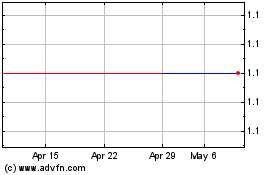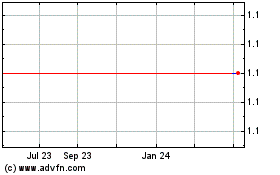By Emre Peker and Natalia Drozdiak
BRUSSELS -- The European Union settled its multiyear antitrust
case against PAO Gazprom on Thursday, clinching promises of cheaper
and freer natural-gas flows from Russia as President Donald Trump
demands that the bloc taps U.S. energy exports and cuts its
dependence on Moscow.
Gazprom pledged to set gas prices in line with open Western
European markets, allow clients to more frequently ask for price
revisions and remove restrictions on reselling gas across borders,
according to the European Commission, the EU's executive body.
In exchange, the Russian state-owned energy giant was able to
avoid billions of dollars in penalties.
The EU's measures drew fire from some member countries and
risked stoking trans-Atlantic tensions by widening bilateral
clashes on issues ranging from trade to foreign policy. The
settlement contrasts with billion-dollar antitrust fines levied
against U.S. tech companies including Alphabet Inc.'s Google and
Qualcomm Inc., as Mr. Trump slams the EU for what he calls the
Europe's unfair treatment of the U.S.
"This case is not about the flag of the company -- it is about
achieving the outcome that best serves European consumers and
businesses," said EU antitrust chief Margrethe Vestager.
Gazprom will "significantly change" the way it operates, she
added, preventing it from squeezing former Soviet Union states and
satellites, Bulgaria, Czech Republic, Estonia, Hungary, Latvia,
Lithuania, Poland and Slovakia with higher prices.
The company would face a fine as high as 10% of its annual
revenue if it reneges on its promises.
"Today's decision puts an end to this behavior by Gazprom," Ms.
Vestager said. "I know that some would have liked to see us fine
Gazprom instead, no matter the solution on the table."
The company has already made some of those changes of its own
volition in response to customer pressure, to safeguard a major
source of Russian state revenues, according to EU diplomats, energy
industry executives and analysts.
Coupled with the commission's settlement, that is allowing
Gazprom to evade punishment, critics of the deal said.
"They are getting away with it," an EU diplomat said. There are
"practically no change of practices -- just minor adjustments."
Poland's EU Affairs Minister Konrad Szymański told the Polish
Press Agency on Tuesday that the bloc had veered off its usual
antitrust approach and missed the opportunity for a "fair and
well-justified" ruling including a "considerable fine."
An antitrust fine would also have strengthened European rivals'
ability to claim damages in court, while the settlement makes any
legal action harder.
Gazprom had already agreed to a set of commitments to settle the
case in 2017, but negotiated tweaks to address reservations by EU
complainants and competitors following a market test.
"We believe that today's decision is the most reasonable outcome
for the well-functioning of the entire European gas market," said
Alexander Medvedev, Gazprom's deputy chairman. "We are
satisfied."
The EU's bid to maintain its energy links to Russia threatens to
undermine its bid to woo the Trump administration, as it negotiates
waivers from U.S. steel and aluminum tariffs.
Mr. Trump granted temporary exemptions to Europe, expiring June
1, while leveling demands including lower levies on American goods
in exchange for waivers. Recently, he upped the ante by also
pressuring Germany to scuttle Gazprom's Baltic Sea pipeline to
Russia -- Nord Stream 2 -- and buy liquefied natural-gas from the
U.S. to meet its energy demands.
EU leaders signaled their willingness to pave the way for U.S.
LNG purchases last week, saying that while they wouldn't negotiate
under threat, they would be open to boosting energy cooperation if
Mr. Trump waives his metals tariffs for the bloc.
"We would like to import more LNG from the United States -- but
this is not at all case-related, this is much more related to our
ambition to diversify energy imports," Ms. Vestager said.
The U.S. push against Russian gas exports may find support from
some EU members, led by Poland. The bloc's Eastern European members
have repeatedly clashed with Nord Stream 2 backers -- particularly
Berlin -- for undermining EU security in exchange for safeguarding
national energy supplies.
Breaking Gazprom's stronghold in the EU will be difficult
regardless of U.S. talks, the fate of Nord Stream 2 and despite the
company's commitments to avoid antitrust fines. Russian gas exports
to the EU are hovering near record highs and supply about a third
of the bloc's annual gas demand.
"Russia will continue to play a key role," said Simone
Tagliapietra, an energy analyst at Brussels-based think tank
Bruegel. "Its gas is considerably cheaper than all other existing
alternatives."
Write to Emre Peker at emre.peker@wsj.com and Natalia Drozdiak
at natalia.drozdiak@wsj.com
(END) Dow Jones Newswires
May 24, 2018 13:12 ET (17:12 GMT)
Copyright (c) 2018 Dow Jones & Company, Inc.
PJSC Gazprom (PK) (USOTC:OGZPY)
Historical Stock Chart
From Mar 2024 to Apr 2024

PJSC Gazprom (PK) (USOTC:OGZPY)
Historical Stock Chart
From Apr 2023 to Apr 2024
